[中考英语]中考情态动词考点及热点分析
初中英语知识点归纳情态动词的概率和态度
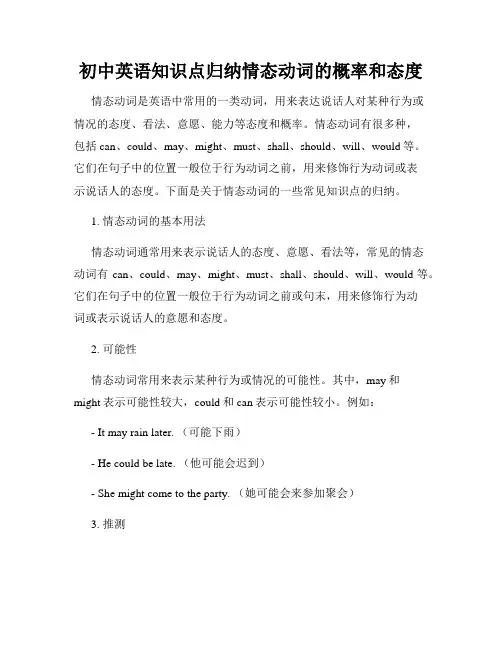
初中英语知识点归纳情态动词的概率和态度情态动词是英语中常用的一类动词,用来表达说话人对某种行为或情况的态度、看法、意愿、能力等态度和概率。
情态动词有很多种,包括can、could、may、might、must、shall、should、will、would等。
它们在句子中的位置一般位于行为动词之前,用来修饰行为动词或表示说话人的态度。
下面是关于情态动词的一些常见知识点的归纳。
1. 情态动词的基本用法情态动词通常用来表示说话人的态度、意愿、看法等,常见的情态动词有can、could、may、might、must、shall、should、will、would等。
它们在句子中的位置一般位于行为动词之前或句末,用来修饰行为动词或表示说话人的意愿和态度。
2. 可能性情态动词常用来表示某种行为或情况的可能性。
其中,may和might表示可能性较大,could和can表示可能性较小。
例如:- It may rain later. (可能下雨)- He could be late. (他可能会迟到)- She might come to the party. (她可能会来参加聚会)3. 推测情态动词还可以用来表示对某种情况或信息的推测。
其中,must表示说话人很肯定,should表示对某种可能性的推测,might表示某种可能性较小。
例如:- He must be busy. (他一定很忙)- She should know the answer. (她应该知道答案)- It might rain tomorrow. (明天可能会下雨)4. 动词的能力情态动词can和could还可以表示某种能力。
can表示具备某种能力,could表示过去具备某种能力或表示某种委婉的说法。
例如:- I can swim. (我会游泳)- He could speak Spanish when he was young. (他小时候会说西班牙语)5. 表示请求或邀请情态动词常用来表达请求或邀请的意思。
【英语】中考考点_情态动词知识点汇总(全)经典
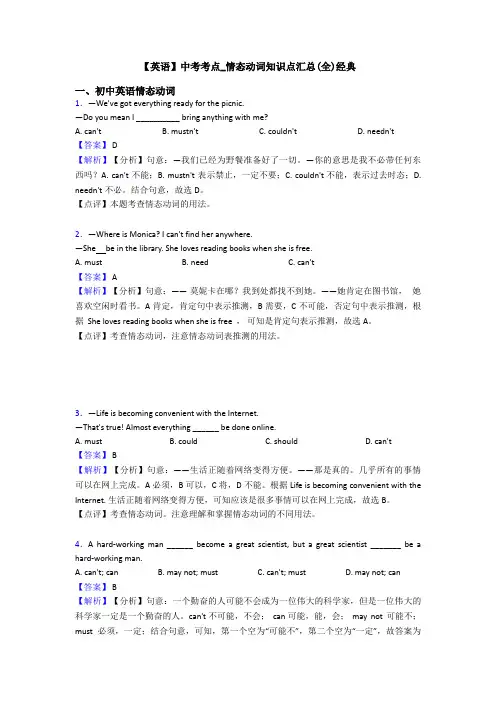
【英语】中考考点_情态动词知识点汇总(全)经典一、初中英语情态动词1.—We've got everything ready for the picnic.—Do you mean I __________ bring anything with me?A. can'tB. mustn'tC. couldn'tD. needn't【答案】 D【解析】【分析】句意:—我们已经为野餐准备好了一切。
—你的意思是我不必带任何东西吗?A. can't 不能;B. mustn't 表示禁止,一定不要;C. couldn't不能,表示过去时态;D. needn't不必。
结合句意,故选D。
【点评】本题考查情态动词的用法。
2.—Where is Monica? I can't find her anywhere.—She be in the library. She loves reading books when she is free.A. mustB. needC. can't【答案】 A【解析】【分析】句意:——莫妮卡在哪?我到处都找不到她。
——她肯定在图书馆,她喜欢空闲时看书。
A肯定,肯定句中表示推测,B需要,C不可能,否定句中表示推测,根据 She loves reading books when she is free ,可知是肯定句表示推测,故选A。
【点评】考查情态动词,注意情态动词表推测的用法。
3.—Life is becoming convenient with the Internet.—That's true! Almost everything ______ be done online.A. mustB. couldC. shouldD. can't【答案】 B【解析】【分析】句意:——生活正随着网络变得方便。
(word版)中考英语情态动词考点归纳与例析,文档
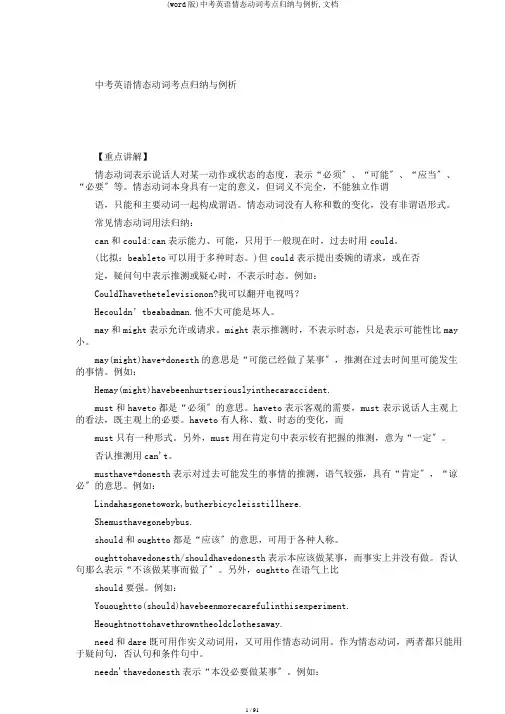
中考英语情态动词考点归纳与例析【重点讲解】情态动词表示说话人对某一动作或状态的态度,表示“必须〞、“可能〞、“应当〞、“必要〞等。
情态动词本身具有一定的意义,但词义不完全,不能独立作谓语,只能和主要动词一起构成谓语。
情态动词没有人称和数的变化,没有非谓语形式。
常见情态动词用法归纳:can和could:can表示能力、可能,只用于一般现在时,过去时用could。
(比拟:beableto可以用于多种时态。
)但could表示提出委婉的请求,或在否定,疑问句中表示推测或疑心时,不表示时态。
例如:CouldIhavethetelevisionon?我可以翻开电视吗?Hecouldn’tbeabadman.他不大可能是坏人。
may和might表示允许或请求。
might表示推测时,不表示时态,只是表示可能性比may 小。
may(might)have+donesth的意思是“可能已经做了某事〞,推测在过去时间里可能发生的事情。
例如:Hemay(might)havebeenhurtseriouslyinthecaraccident.must和haveto都是“必须〞的意思。
haveto表示客观的需要,must表示说话人主观上的看法,既主观上的必要。
haveto有人称、数、时态的变化,而must只有一种形式。
另外,must用在肯定句中表示较有把握的推测,意为“一定〞。
否认推测用can't。
musthave+donesth表示对过去可能发生的事情的推测,语气较强,具有“肯定〞,“谅必〞的意思。
例如:Lindahasgonetowork,butherbicycleisstillhere.Shemusthavegonebybus.should和oughtto都是“应该〞的意思,可用于各种人称。
oughttohavedonesth/shouldhavedonesth表示本应该做某事,而事实上并没有做。
否认句那么表示“不该做某事而做了〞。
中考英语情态动词考点总结与归纳
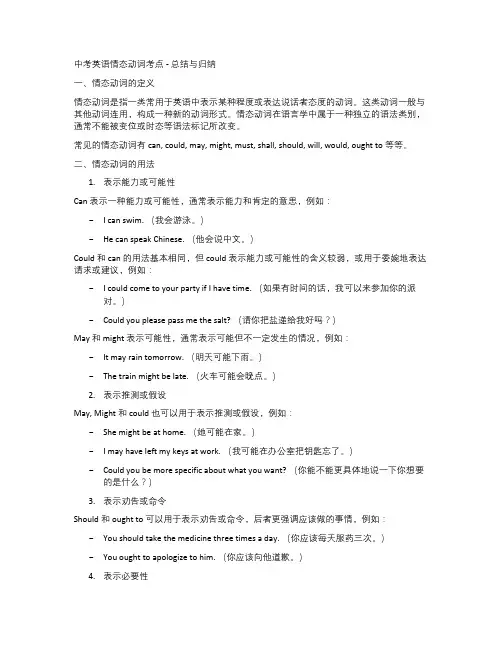
中考英语情态动词考点 - 总结与归纳一、情态动词的定义情态动词是指一类常用于英语中表示某种程度或表达说话者态度的动词。
这类动词一般与其他动词连用,构成一种新的动词形式。
情态动词在语言学中属于一种独立的语法类别,通常不能被变位或时态等语法标记所改变。
常见的情态动词有 can, could, may, might, must, shall, should, will, would, ought to 等等。
二、情态动词的用法1.表示能力或可能性Can 表示一种能力或可能性,通常表示能力和肯定的意思,例如:-I can swim. (我会游泳。
)-He can speak Chinese. (他会说中文。
)Could 和 can 的用法基本相同,但 could 表示能力或可能性的含义较弱,或用于委婉地表达请求或建议,例如:-I could come to your party if I have time. (如果有时间的话,我可以来参加你的派对。
)-Could you please pass me the salt? (请你把盐递给我好吗?)May 和 might 表示可能性,通常表示可能但不一定发生的情况,例如:-It may rain tomorrow. (明天可能下雨。
)-The train might be late. (火车可能会晚点。
)2.表示推测或假设May, Might 和 could 也可以用于表示推测或假设,例如:-She might be at home. (她可能在家。
)-I may have left my keys at work. (我可能在办公室把钥匙忘了。
)-Could you be more specific about what you want? (你能不能更具体地说一下你想要的是什么?)3.表示劝告或命令Should 和 ought to 可以用于表示劝告或命令,后者更强调应该做的事情,例如:-You should take the medicine three times a day. (你应该每天服药三次。
中考考点_情态动词知识点汇总
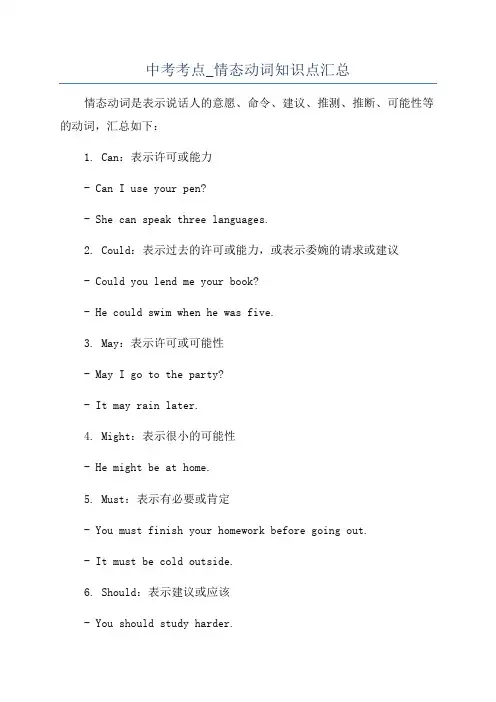
中考考点_情态动词知识点汇总情态动词是表示说话人的意愿、命令、建议、推测、推断、可能性等的动词,汇总如下:1. Can:表示许可或能力- Can I use your pen?- She can speak three languages.2. Could:表示过去的许可或能力,或表示委婉的请求或建议- Could you lend me your book?- He could swim when he was five.3. May:表示许可或可能性- May I go to the party?- It may rain later.4. Might:表示很小的可能性- He might be at home.5. Must:表示有必要或肯定- You must finish your homework before going out.- It must be cold outside.6. Should:表示建议或应该- You should study harder.7. Shall:表示征求意见或提出建议,或用于第一人称的疑问句中- Shall we go to the movies tonight?- What shall I do with this problem?8. Will:表示意愿、意愿、习惯或将来的行动- I will help you with your homework.- She will be here in a few minutes.9. Would:表示过去的意愿或习惯,或表示委婉的请求、邀请或建议- Would you like some tea?- He would always go for a walk after dinner.10. Ought to:表示应该,常用于表达责任或义务- You ought to apologize for what you did.这些是常见的情态动词,掌握它们的用法可以帮助你更准确地表达自己的意图和观点。
中考英语情态动词考点归纳与例析
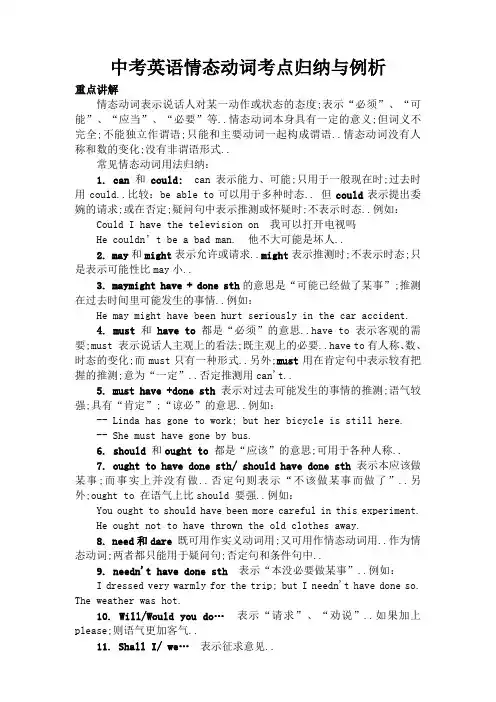
中考英语情态动词考点归纳与例析重点讲解情态动词表示说话人对某一动作或状态的态度;表示“必须”、“可能”、“应当”、“必要”等..情态动词本身具有一定的意义;但词义不完全;不能独立作谓语;只能和主要动词一起构成谓语..情态动词没有人称和数的变化;没有非谓语形式..常见情态动词用法归纳:1.can和could: can表示能力、可能;只用于一般现在时;过去时用could..比较:be able to可以用于多种时态.. 但could表示提出委婉的请求;或在否定;疑问句中表示推测或怀疑时;不表示时态..例如:Could I have the television on 我可以打开电视吗He couldn’t be a bad man. 他不大可能是坏人..2. may和might表示允许或请求..might表示推测时;不表示时态;只是表示可能性比may小..3. maymight have + done sth的意思是“可能已经做了某事”;推测在过去时间里可能发生的事情..例如:He may might have been hurt seriously in the car accident.4. must和have to都是“必须”的意思..have to 表示客观的需要;must 表示说话人主观上的看法;既主观上的必要..have to有人称、数、时态的变化;而must只有一种形式..另外;must用在肯定句中表示较有把握的推测;意为“一定”..否定推测用can't..5. must have +done sth 表示对过去可能发生的事情的推测;语气较强;具有“肯定”;“谅必”的意思..例如:-- Linda has gone to work; but her bicycle is still here.-- She must have gone by bus.6. should和ought to 都是“应该”的意思;可用于各种人称..7. ought to have done sth/ should have done sth 表示本应该做某事;而事实上并没有做..否定句则表示“不该做某事而做了”..另外;ought to 在语气上比should 要强..例如:You ought to should have been more careful in this experiment.He ought not to have thrown the old clothes away.8. need和dare 既可用作实义动词用;又可用作情态动词用..作为情态动词;两者都只能用于疑问句;否定句和条件句中..9. needn't have done sth 表示“本没必要做某事”..例如:I dressed very warmly for the trip; but I needn't have done so. The weather was hot.10. Will/Would you do… 表示“请求”、“劝说”..如果加上please;则语气更加客气..11. Shall I/ we… 表示征求意见..12. would like to do sth 表示“想要做某事= want to do sth”;为固定搭配..例如:Would you like to go with me中考链接1. -- Can I go fishing with you; Dad-- No; you ________. You ________ stay at home and do your homework first.A. won’t; mayB. can’t; mustC. shouldn’t; oughtD. needn’t; should答案:B..解析问句是说“可以去钓鱼吗”从答句结尾可知;父亲是叫孩子呆在家里做作业;所以否定回答应为No; you can’t..2. -- Our class won the English speaking contest.-- Congratulations You________ be very proud of it.A. canB. needC. wouldD. must答案:D..解析根据上下文;本题要填表示肯定推测的must..答句的意思是“祝贺你们你们一定为此而自豪..”3.-- Have you seen my glassesI ________ find them.-- Sorry; I haven’t seen them.A. can’tB. shouldn’tC. won’tD. mustn’t答案:A..解析提问的人是在找不到自己的眼镜的情况下问“Have you seen my glasses ”的;所以选A..4. -- Must I write all the words down now-- No; you ________.A. mustn`tB. can’tC. won’tD. needn’t答案:D..解析用must提问时;否定回答表示“不必要”时;用needn’t..5. -- The sports shoes must be Linda’s.-- No; they _____ be. They’re too small for her.A. mustn’tB. can’tC. may notD. might not答案:B..解析从答句开头可知;这里是有把握的否定判断;要用can’t..句意为“不可能是”..6. -- You ________sleep in class.-- Sorry; Miss Wang. I _______.A.mustn’t; mustn’tB. can’t ; needn’tB.C. mustn’t; won’t D. shouldn’t ; may not答案:C..解析mustn’t 表示禁止;意思是“千万不要”..第二空填won’t; 表示“我不会再睡觉的” ..7. -- May I take the magazine out of the reading room-- _______. Please read it here.A. Certainly.B. No; you need n’tC. No; you can’t.D. No; you may not.答案:C..解析阅览室的杂志一般只能在阅览室里看;是不可以拿走的..”can’t”表示“不可以”;语气较强;所以选C..8. -- Excuse me ; how can I get to the hi-tech Exhibition Hall-- Sorry; I am new here. The policeman over there ______know.A. shallB. mayC. needD. would答案:B..解析may表示猜测;意思为“可能”..问句的意思是“怎样去高交会馆”..回答是“那边的警察可能知道..”9. You ________ return the book now. You can keep it for another week.A. needn’tB. mustn’tC. can’tD. won’t答案:A..解析从结尾一句的意思判断选A ..needn’t的意思是“不必”..10. -- Tom; where is your father-- I’m not sure. He _______ in his office.A. isB. may beC. maybeD. may答案:B..解析从“I’m not sure”判断;回答问题的人不能确定他父亲在那里;所以排除A..而C和D在句中都不能单独作谓语;故选B..11. He went back home just now. He ___be here now.A. mightn’tB. needn’tC. can’tD. has to答案:C..解析can’t表示表示猜测;意思是“不可能”..习题精炼1. -- Could I borrow your dictionary--Yes; of course; you______.A. mightB. willC. canD. should2. -- Shall I tell John about it-- No; you _______. I've told him already.A. needn'tB. wouldn'tC. mustn'tD.shouldn't3. Tom ought not to ___ me your secret; but he meant no harm.A. tellB. have toldC. be tellingD.having told4. -- May I smoke here-- No; you _______.A. mustn'tB. don'tC. needn'tD.must5. You _______ to school tomorrow if you go to look after your motherin the hospital.A. don't need comeB. don't comeC. needn't to comeD. needn't come6. -- Is the girl in red Mary-- No; it _______ be Mary . She's doing her homework at home.A. mustB. mayC. can'tD. mustn't7. -- Why isn’t Tom in school today-- He _____ be sick; or he’d have been here already.A. shouldB. mustC. mayD. would8. -- Is Mr Hu in the reading room--No; he _____be there. He has gone to Tianjing.A. mustn’tB. needn’tC. won’tD. can’t9. -- May mustn’t I go swimming in the river; Mum-- No; you ______. It’s dangerous.A. mustn’tB. needn’tC. don’tD. haven’t10. -- ______you like to go shopping with me-- Yes; I ________.A. Would; wouldB. Will; will likeC. Would; would loveD. Would ; would love to11. -- Must I hand in the homework now-- No ; you ______. But you _____hand it in tomorrow.A. mustn’t; mustB. needn’t; have toC. needn’t;canD. musn’t; must答案详解1. 答案:C..解析问句开头的could表示委婉的语气;并不表示时态..答语中of course表示肯定的语气;允许某人做某事时;用can和 may来表达;不能用could或might..2. 答案:A..解析needn't 意为“不必”;“不用”.. wouldn't意为“将不”;“不会的”.. mustn't意为“禁止”;“不可以”.. shouldn't意为“不应该”..从结尾的一句的意思判断;这里要用needn't..3. 答案:B..解析由于后半句为过去时;可见“告诉秘密”的动作发生在其前;因此ought not to 后要用完成时“have told”..4. 答案:A..解析问句的意思是“我可以在这儿抽烟吗”;否定回答为“你不可以”;因此选A..mustn't含有禁止意味;语气比 may not强..5. 答案:D..解析从语法结构上看;A项中 come前缺 to.. C 项中come前的 to应去掉..6. 答案:C..解析根据最后一句“玛丽正在家里做家庭作业”这一信息;可知“穿红衣服的姑娘不是玛丽”;应用can't;表否定的推测..故选C..7. 答案:B..解析must和may都有表示猜测的用法..Must表示的可能性较大;而 may表示可能性较小..从答句中我们可以判断这里的可能性应该较大;因为“他肯定生病了;否则;他早就到这儿了”..所以该题的答案为B...8. 答案:D..解析根据最后一句判断;Mr Hu已经去天津了;他不可能在这里..表示否定的推测要用can’t..mustn’t 表示“不可以”;不允许;needn’t表示“不必”; won’t表示“不会”猜测的意思.. 所以选D..9. 答案:A..解析mustn’t表示禁止意味;意思是“不可以”..10. 答案:D..解析Would you like to ….. 的肯定回答要用 I would love to或 I would like to..would可以省略为“d ”;但结尾的 to不能省略..11. 答案: B..解析第一空只能用needn’t;第二空可以用must或have to..。
中考考点_情态动词知识点汇总(全)
中考考点_情态动词知识点汇总(全)一、初中英语情态动词1.— Dick, ________ I use your e-dictionary? — Yes, sure. ________ you give it to David after you use it?A. will; WouldB. may; MightC. can; CouldD. shall; Should【答案】 C【解析】【分析】句意:一Dick我可用一下你的电子词典吗?一当然可以。
在你用完后你能把它给他David吗?根据句意及题干分析第一空表示请求允许,所以可以用may或can;第二空是表示对别人的请求.所以用could表示更加委婉,故选C。
2.All passengers ______ go through safety check before they take a plane.A. canB. mayC. mustD. could【答案】 C【解析】【分析】句意:所有乘客登机前必须接受安全检查。
A. can能够,表示能力;B. may可以,表示许可;C. must必须;D. could可能,可以。
登机前必须安检。
故选C。
【点评】情态动词词义辨析。
以及can、may、must、could四个词的词义和用法。
3.Please don't make so much noise. I ________ hear the speaker very well.A. needn'tB. can'tC. shouldn'tD. mustn't【答案】 B【解析】【分析】句意:请不要发出那么多噪音。
我不能很好地听清楚发言者的话。
needn't不必;can't不能;shouldn't不应该;mustn't禁止。
根据前半句的Please don't make so much noise.可知别人发出了太多噪音,所以他无法听见演讲者的话,故用情态动词can't。
中考英语复习,必考的语法重点系列之情态动词用法归纳
中考英语复习,必考的语法重点系列之情态动词用法归纳情态动词是每年中考必考的考点之一,看似不难,但是从同学们得分情况看,其中的一些知识点还是很容易出错的。
今天我们就情态动词的用法及考点作详细归纳,只为帮助到更多有需要的同学们。
一、情态动词的基本用法情态动词本身是有意义的,通常表示说话人认为某事“可能、或许、应该”发生等。
它没有人称和数的变化,在句子当中不能单独作谓语,只能跟后面的动词一起构成谓语。
常考点之一:情态动词后接动词原形。
常见的情态动词主要有:以上这些情态动词,可以分成四类,分别是:只作情态动词(must,can/could,may/might,ought to );既是实义动词,又是情态动词(need,dare );既是助动词,又是情态动词(shall/should,will/would);具有情态动词特点词(have/had to,used to)。
情态动词记忆口诀:为了方便记忆和区分这些情态动词的意义和用法,大家可以利用下面的口诀。
情态动词表委婉,动词原形跟后面。
can“能力”may“许可”,must“责任”或“义务”;否答needn’t表“不必”;need“需要”,dare“敢”;should “应该”would“愿”,have to“被迫”因客观。
这里其中包含了考点must和 have to的用法区别以及needn’t用法。
具体用法下面将会讲到。
二、情态动词考点分析1、can和could的用法和考点1)表示能力或客观可能性,还可以表示请求和允许。
如:Can you come here tomorrow?考点注意:1)could表示请求,语气更委婉,主要用于疑问句,不可用于肯定句,答语应用can,也就是说现在时态的回答语不能用could。
如:Could I borrow this book from you?Yes,you can. (否定答语可用No/Sorry,I’m afraid not.)2)can表示能力时,还可用be able to代替。
中考英语情态动词知识点归纳 附解析
中考英语情态动词知识点归纳附解析一、选择题1.You'd better __________ hard from now on, __________ you will fail the exam.A.work; and B.working; or C.working; and D.work; or2.To my joy, we_________ go to the bank. Mary has lent us some money.A.shouldn’t B.needn’t C.couldn’t D.wouldn’t 3.—Who is singing next door? It sounds like a young girl’s voice.—It _________ be Jane. But she seldom sings English songs.A.need B.must C.may D.can4.Hurry up, or we ________ miss the beginning of the film.A.should B.must C.may D.have to 5.—Must the children leave at six tomorrow morning?—No, they _______. They can have more time to get ready for the trip.A.can’t B.needn’t C.mustn’t D.may not 6.—Why didn’t you tell it to me earlier?— Why ________ I? I want to have my own secret.A.can B.may C.should D.shall 7.—Mum, why do I have to wear a mask before entering the supermarket?—For your health and safety, you ________ be too careful.A.shouldn’t B.can’t C.mustn’t D.needn’t 8.—Dad, must we wait until the light becomes green?—Yes, I am af raid we ________. That’s the traffic rule.A.may B.can C.have to D.need9.It’s of great importance to protect the environment. Each of us ________ take an active part in it.A.can B.may C.would D.should10.You ________ write the report again because spelling mistakes are not allowed at all. A.must B.can C.may D.could11.You ________ be careful with the camera. It costs!A.can B.will C.should D.may12.When you visit a museum, some instructions should ________ and we’d better not ________ them.A.pay attention to; be against B.be paid attention; againstC.be paid attention to; against D.be paid attention to; be against13.I ________ hear you clearly. Would you please repeat it?A.mustn’t B.can’t C.needn’t D.shouldn’t 14.—Have you decided to take up teaching as career after graduation?—I ________ go abroad for further education instead. But it depends.A.must B.should C.may D.shall15.The boy is very brave.I ________ he ________ the tall tree.A.dare say; dares to climbB.dare to say; dare climbingC.dare saying; dares climbD.dare to say; dares climbed16.—Shall we go camping this summer holiday?—Nothing________be better.A.should B.could C.must D.may 17.—Would you please________in that way? That’s not safe!—Sorry. I won’t do it any more.A.not driving B.not to drive C.no driving D.not drive 18.—Ready? Let’s get started, Martin.— Swimming? I just ________ get used to it in winter.A.can’t B.needn’t C.mustn’t D.shouldn’t 19.Dr. Zhong Nanshan once said, "To prevent the spread of this disease, we________never be too careful."A.can B.may C.must D.should20.—________ you give me a hand? I can’t put up the poster by myself.—No problem.A.Could B.Should C.Need D.Must21.For the safety of the passengers, objects like guns ________ be carried on board.A.may not B.needn’t C.might not D.mustn’t 22.According to the rule, used batteries ________ be dropped in the red bin for harmful wastes. A.may B.would C.should D.might23.You _________ smoke here! Look at the sign. It says "No smoking".A.needn't B.mustn't C.can D.may24.We've discussed every detail of this plan and have got everything ready. But still something ________ go wrong. We still have to be very careful.A.must B.should C.would D.may25.—Suzy described every detail of the accident just now.—Her memory ________ be completely back.A.shall B.need C.must D.could26.—Is it usually warm in Yancheng in May?—Yes. But it _______ be rather cold sometimes.A.must B.should C.would D.can27.When people are waiting at the zebra crossing, cars and buses ________ wait and let them go first.A.must B.may C.can D.need28.—Shall I tell him the change of the time right now?—I’m afraid you ________, otherwise he will be late for the meeting.A.can B.may C.must D.need29.—Is it really necessary for me to go shopping with a mask on?—I’m afraid you ________ in public. It is not only to protect yourself but also to protect others. A.must B.should C.can D.need 30.—Could you tell me how to renew the library books?—With pleasure. You ________ come to our desk every time. It’s easi er to renew them online. A.can’t B.mustn’t C.needn’t D.shouldn’t31.A hard-working man ________ become a great scientist, but a great scientist ________ be a hard-working man.A.can’t; can B.may not; must C.can’t; must D.may not; can 32.—The article says t hat a person’s animal sign decides his personality.—You ________ read it for fun, but don’t believe in that.A.can B.must C.shouldn’t D.needn’t 33.—How beautiful the winter jasmines (迎春花) are!—Yes. These golden-yellow flowers ________ be widely seen in my city in March.A.must B.can C.would D.should 34.—Mum, I bought some strawberries on my way home.—Oh, you’re so sweet. But the strawberries ________ be put into the fridge for freshness. A.must B.can C.may D.need35.— What do you think of the show yesterday?— Some of them were really good but others ________ be better.A.will B.must C.need D.can36.—In China, many students have to stay up late to do their homework.—No worries. The government has realized the problem. I’m sure there ________ be good news soon.A.can B.should C.must D.need 37.—May I have some wine to drink?—No, you ________. You have to drive home later.A.mustn’t B.needn’t C.can’t D.may not 38.—________ I see your ID card? We have to check your personal information.—Sure. Here you are.A.May B.Need C.Should D.Must39.We teenagers ________ have dreams. With dreams and hard work, anything amazing________ be created.A.may; can B.might; should C.should; can D.must; has to 40.Cars ________ give way to walkers on some roads in Binhai, or the drivers will be fined. A.may B.will C.can D.must【参考答案】一、选择题1.D解析:D【详解】句意:你最好从现在开始努力学习,否则你考试会不及格的。
初中英语情态动词详细用法归纳(含练习及答案)
初中英语情态动词详细用法归纳(含练习及答案)情态动词有具体的词义, 但也同助动词一样, 需要与其他词语一起构成句子的谓语, 另外情态动词没有人称和数的变化, 情态动词后必须跟动词原形。
1.ca.的用法:(1).表示能力、许可、可能性.表示能力时一般译为“能、会”.即有种能力, 尤其是生来具备的能力.如:Sh.ca.swi.fast.bu..can’.. 她能游得很快, 但我不能。
.ca.se.wit.m.eyes.我用眼睛看。
could是can的过去式。
表示过去的能力.b.abl.t.d.sth.常常指经过努力,花费了时间和劳力之后才能做到某事。
is/am/ar.abl.t.d.sthwas/were able to do sth.(2).表示许可, 常在口语中。
如: .m.dictionary..你可以用我的字典。
(3).表示推测, 可能性, 意为“可能”.常用于否定句和疑问句中.此时can’.译为.不可能”.如:Ca.th.new.b.true.这个消息会是真的吗?—Ca.i.b.ou.teacher?那个人有可能是我们老师吗?—No.i.can’.b.ou.teacher.H.i.o..visi.t.th.Grea.Wall.不可能。
咱们老师正在游览长城呢。
【例题】—.thin.Mis.Ga.mus.b.i.th.library.Sh.sai.sh.woul.g.there.—No.Sh.__b.there..hav.jus.bee.there..A.can’.B.mustn’.C.needn’.D.wouldn’t【解析】根据下文“我刚去过那儿”可知, 应为“不可能”, can’t 表示推测[答案] Acould的用法:(1).can的过去式, 意为.能.会”, 表示过去的能力。
如: H.coul.writ.poem.whe.h.wa.10. 他十岁时就会写诗。
(2).could在疑问句中, 表示委婉的语气, 此.coul.没有过去式的意思。
- 1、下载文档前请自行甄别文档内容的完整性,平台不提供额外的编辑、内容补充、找答案等附加服务。
- 2、"仅部分预览"的文档,不可在线预览部分如存在完整性等问题,可反馈申请退款(可完整预览的文档不适用该条件!)。
- 3、如文档侵犯您的权益,请联系客服反馈,我们会尽快为您处理(人工客服工作时间:9:00-18:30)。
情态动词考点及热点分析一、考查can的用法a.考查can表示能力的用法。
在这一用法中,can表示能力,意思是"能,会",其否定式can't表示"不能"。
在过去时中用could和couldn't。
例如:1.-Where's Mr Lee? I have something unusual to tell him. -You________find him. He________Japan. (2003黑龙江)A. may not; has gone toB. may not; has been toC. can't; has gone toD. can't; has been to2.-Finish drawing a horse in ten minutes. OK? -Sorry. It________in such a short time. (2003山东威海)A. may doB. can't be doneC. must doD. needn't be done3. I have my own room in my house, so I________do what I want in it. (2002江西)A. mustB. have toC. need toD. can4.________you mend my car? I______not start it. (2002常德市)A. Would; wouldB. Must; mustC. Can; canD. May; may5.________she ride when she was three years old?( 2002长沙市)A. CanB. CouldC. NeedD. May6. The boy________answer this kind of hard questions one year ago.(2002四川省)A. canB. mayC. couldAnswers: 1. C 2. B 3. D 4. C 5. B 6. Cb.考查can表示推测的用法。
在这一用法中,can意为"可能",表示客观可能性,常常用于疑问句和否定句中。
例如:7. Who is the man over there? Is it Mr Li? -No, it________be him. Mr Li is much taller. (2003河北)A. mustn'tB. may notC. can'tD. needn't8. -Listen! Someone is singing in the next room. Who________it be? Is it Wei Fang? -No. It________be her. She is at school now. (2002重庆市)A. will; may notB. must; mustn'tC. may; can'tD. may; won't9. -Is Mr Hu in the reading room? -No, he________be there. He has gone to Tianjin. (2002新疆)A. mustn'tB. needn'tC. won'tD. can't10. Class 3 won the football match! ________it be true?(2002广东)A. MayB. MustC. WillD. CanAnswers: 7. C 8. C 9. D 10. Dc.考查can / could表示请求许可的用法?在这一用法中,can和could都表示现在,用could比用can语气更加委婉客气,常用Could I / you...?句式,表示"我 / 你能......吗?" 若表示同意要用can, 不用could?例如:11.-Could I look at your pictures? -Yes, of course you________. (2003武汉)A. couldB. canC. willD. might12.________you pass me a pen? I'd like to write down the telephone number. (2002北京市海淀区)A. NeedB. CouldC. MustD. ShouldAnswers: 11. B 12. B二、考查must的用法a. 考查must表示义务的用法。
在这一用法中,must意为"必须","应该",表示必须要做的事,其否定式mustn't表示禁止,即不许对方做某事?例如:13.-May I go to the cinema, Mum? -Certainly. But you________be back by 11 o'clock. (2003安徽)A. canB. mayC. mustD. need14.-SARS is such a terrible disease. -Yes, it is. We________be more careful. (2003浙江嘉兴)A. canB. mayC. mustD. need15. To make our city more beautiful, rubbish________into the river. (2003重庆)A. needn't be thrownB. mustn't be thrownC. can't throwD. may not throw16. These books________out of the reading room. You have to read them here.(2003辽宁)A. can't takeB. must be takenC. can takeD. mustn't be taken17. Cars, buses and bikes________stop when traffic lights change to red. (2002上海市)A. canB. mayC. mustD. needAnswers: 13. C 14. C 15. B 16. D 17. C要注意must和have to的用法区别?must表示说话人的主观看法,而have to表示客观的需要,意思是"不得不"?例如:18. -Can you go swimming with us this afternoon? -Sorry, I can't. I________take care of my little sister at home because my mother is ill. (2003南京)A. canB. mayC. wouldD. have toAnswer: 18. D回答must开头的一般疑问句,如果是否定的回答,要用needn't或don't have to,表示"不必","没有必要" 的意思,不用mustn't,因为mustn't表示禁止或不许,意思是"一定不要"的意思。
例如:19. -Must I finish the work before five o'clock? -No, you________. (2003四川)A. needn'tB. mustn'tC. have to20. -________I come back before five o'clock? -No, you________. But you________be back later than seven o'clock.(2002烟台市)A. Need; must; mustn'tB. May; mustn't; can'tC. Can; can't; can'tD. Must; needn't; can't21. -Must I clean the room right now? -No, you________. You________clean it after lunch. (2002徐州市)A. needn't; canB. needn't; mayC. mustn't; canD. mustn't; mayAnswers: 19. A 20. D 21. Bb. 考查must表示推测的用法。
在这一用法中,must意为"一定","肯定",表示可能性很大,通常用于肯定句,在否定句中要用can't,表示"不可能"。
例如:22. Susan's parents have bought a large house with a swimming pool. It ____be very expensive. (2003上海)A. mustB. canC. mustn'tD. can't23. This book________Lucy's. Look! Her name is on the book cover. (2002河南)A. must beB. may beC. can't beD. mustn't beAnswers: 22. A 23. A三、考查may的用法a. 考查may表示请求许可的用法在这一用法中,may表示许可或征询对方许可,表示"可以"的意思,常常与第一人称I连用,构成May I...?句式,表示"我可以......吗?"肯定回答用Yes, you may.; Yes, please.等;否定回答用No, you can't.或No, you mustn't., 不用No, you may not.?例如:25. -________I have your name, please? -Yes, Michael. M-I-C-H-A-E-L. (2002北京市东城区)A. MustB. WillC. MayD. Need26. -May I go to the cinema, dad? -No, you________. You must finish your homework first. (2002浙江金华市)A. mustn'tB. won'tC. don'tD. needn't27. -May I smoke here? -________, you________. It can be dangerous. (2002滨州市)A. Yes; canB. No; can'tC. Yes; mayD. No, needn'tAnswers: 25. C 26. A 27. B②测试may表示可能性的用法。
